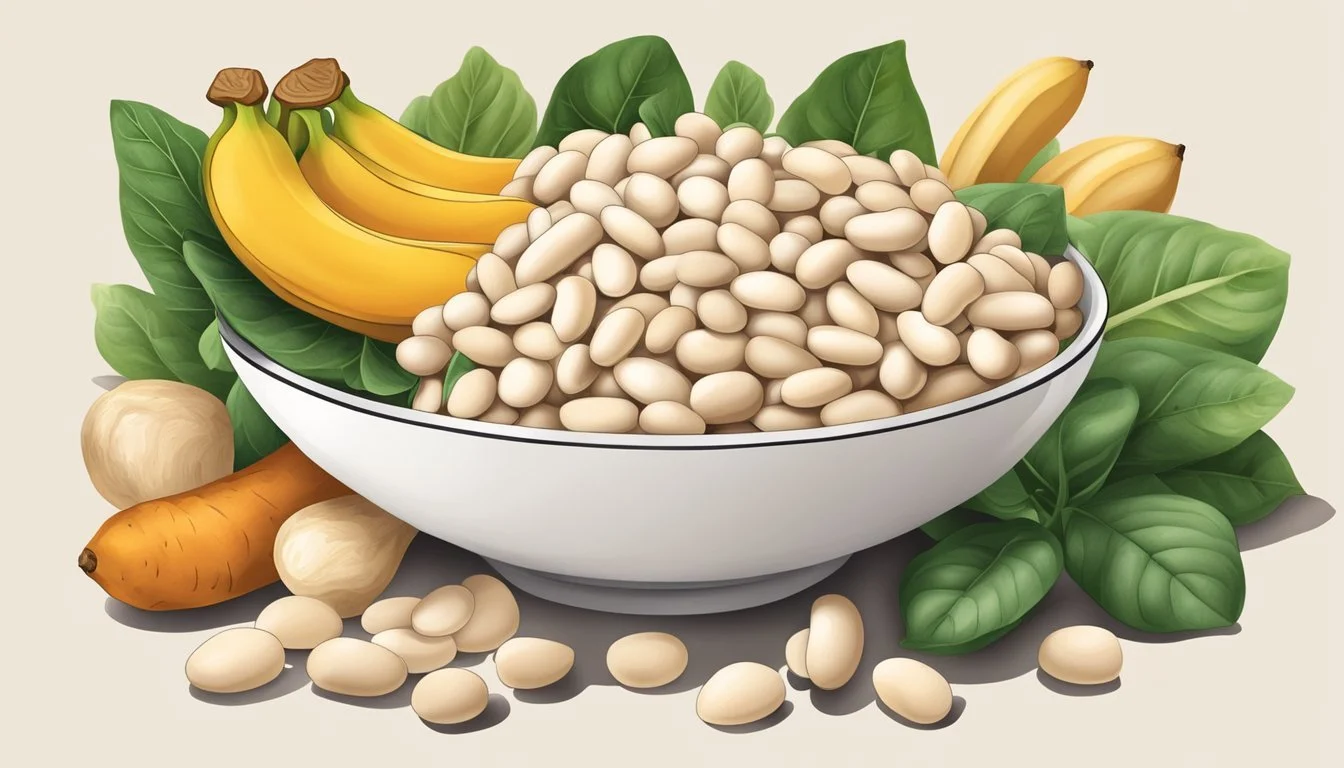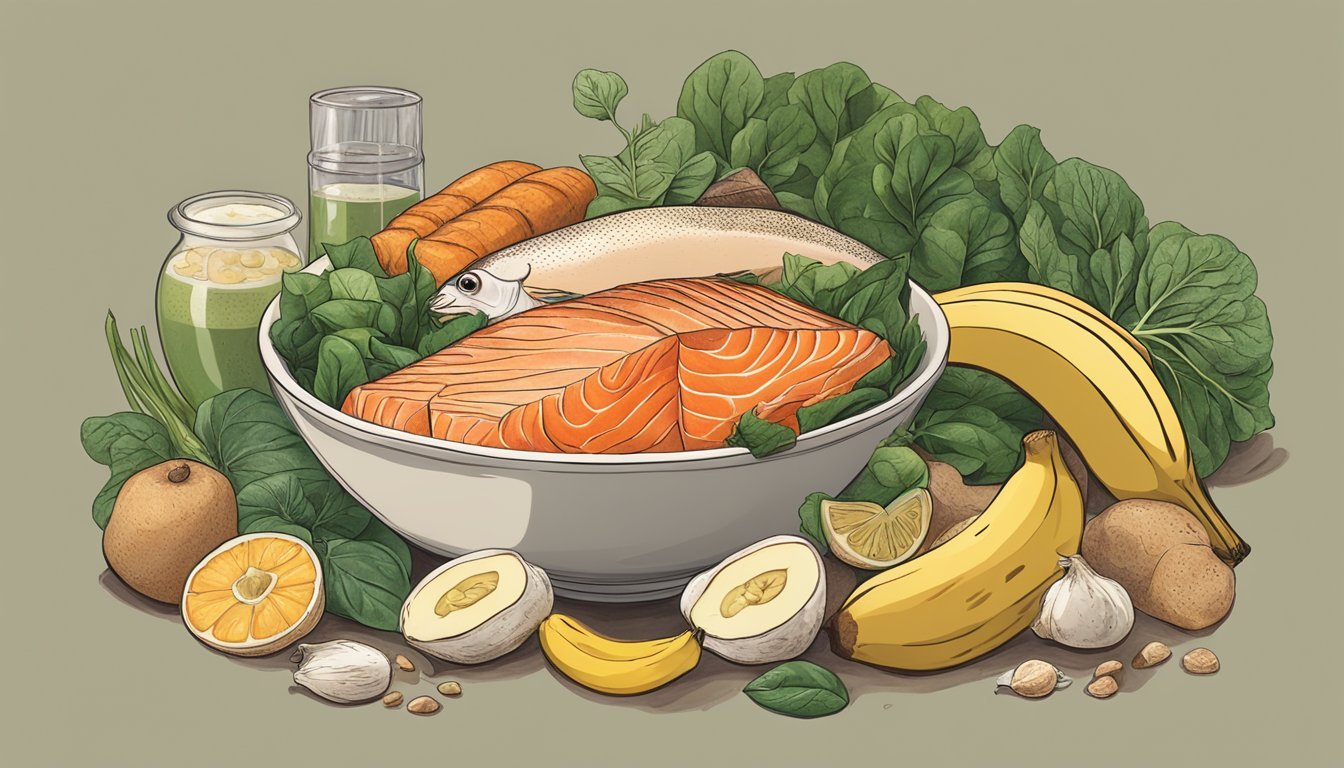15 Potassium-Rich Foods to Boost Your Health
Top 20 Sources for Optimal Health
Understanding which foods are high in potassium is crucial for maintaining a balanced diet and supporting essential bodily functions. Potassium is an essential mineral that plays a vital role in muscle function, nerve signaling, and fluid balance within the body.
Incorporating potassium-rich foods into your diet helps ensure you meet your daily nutritional needs while promoting heart health and proper muscle function. Whether you're looking to increase your potassium intake or need to manage it due to health conditions, having a comprehensive list of potassium-rich foods can guide your dietary choices effectively.
1) Bananas
Bananas are one of the most well-known sources of potassium. A medium-sized banana contains approximately 422 milligrams of potassium, which helps maintain heart health and muscle function.
In addition to potassium, bananas are rich in vitamins C and B6. They also offer dietary fiber, which aids digestion and promotes a healthy gut.
Their natural sweetness makes bananas a popular snack and a versatile ingredient. They can be added to smoothies, cereals, and baked goods.
Due to their relatively low cost and wide availability, bananas are an accessible choice for many people looking to increase their potassium intake.
Bananas also have the advantage of being convenient and easy to carry, making them a practical option for those on the go.
2) Sweet Potatoes
Sweet potatoes are a nutrient-rich root vegetable, widely celebrated for their high potassium content. A 100-gram serving of sweet potatoes provides approximately 337 milligrams of potassium. This makes them an excellent option for those looking to boost their potassium intake.
Beyond potassium, sweet potatoes are packed with other essential nutrients. They are rich in beta-carotene, which the body converts into vitamin A. This vitamin is crucial for maintaining good vision, a healthy immune system, and proper functioning of the heart, lungs, and kidneys.
Sweet potatoes also offer a good source of dietary fiber, which aids in digestion and helps maintain a healthy intestinal tract. They can be prepared in various ways, including baking, boiling, or roasting, making them a versatile ingredient in many dishes.
In addition to their nutritional benefits, sweet potatoes have a naturally sweet flavor that pairs well with both savory and sweet dishes. Whether included in a hearty stew or a simple side dish, they are a tasty and nutritious addition to any meal plan aiming to increase potassium intake.
3) Spinach
Spinach is a versatile and nutrient-dense leafy green, making it a great addition to any diet. It is particularly rich in potassium, which is essential for various bodily functions.
A 100-gram serving of raw spinach contains about 558 milligrams of potassium. This serving size corresponds to roughly two-thirds of a cup. Potassium helps regulate fluid balance, muscle contractions, and nerve signals.
In addition to potassium, spinach also offers other important nutrients. It is a good source of vitamins A, C, and K, as well as folate and iron. Its low calorie and low-fat content make it an excellent choice for those looking to maintain a healthy weight.
The high potassium content in spinach can be beneficial for heart health. It may help lower blood pressure levels and reduce the risk of stroke. People with kidney issues should consult their doctor before significantly increasing their spinach intake.
Adding spinach to meals is easy. It can be incorporated into salads, smoothies, and cooked dishes. Spinach's mild flavor blends well with various foods. Spinach can be an important component of a potassium-rich diet.
4) Avocados
Avocados are a versatile and nutrient-dense food that is rich in potassium. Half an avocado without the skin and seed (approximately 68 grams) provides a significant amount of this essential mineral. This makes it an excellent choice for boosting daily potassium intake.
Besides potassium, avocados contain healthy fats, particularly monounsaturated fats, which are good for heart health. They also provide vitamin K and folate, adding to their nutritional benefits.
Due to their creamy texture and mild flavor, avocados can be easily incorporated into various meals. They can be added to salads, spread on toast, or blended into smoothies for an extra nutrient boost. This makes them a popular choice for many when looking to increase potassium consumption.
5) White Beans
White beans are an excellent source of potassium, providing significant health benefits. A half-cup of cooked white beans offers 502 mg of potassium, making them one of the richest sources among legumes.
In addition to potassium, white beans are packed with fiber and protein, supporting digestive and muscle health. They also contain essential micronutrients such as folate and magnesium.
Incorporating white beans into the diet can help improve heart health. Their high potassium content can aid in reducing cardiovascular disease risk by regulating blood pressure.
White beans are versatile and can be added to various dishes. They can be included in soups, salads, and casseroles, making them an easy addition to a potassium-rich diet.
Regular consumption of white beans can contribute to overall nutritional intake, providing important nutrients while enhancing meal variety.
6) Salmon
Salmon is a notable source of potassium, especially wild-caught varieties. A 3.5-ounce (100-gram) serving of wild salmon provides approximately 13% of the daily value (DV) for potassium. Farmed salmon also contributes, though slightly less, at around 8% of the DV per the same serving size.
In addition to its rich potassium content, salmon is packed with omega-3 fatty acids, which are beneficial for cardiovascular health. The combination of potassium and omega-3s makes salmon a heart-healthy choice.
Moreover, salmon is versatile and can be prepared in various ways—grilled, baked, or poached—making it a convenient option for many meals. This fish not only supports potassium intake but also supplies high-quality protein and essential vitamins.
7) Orange Juice
Orange juice is a well-known source of potassium. A single cup, about 248 grams, provides approximately 496 milligrams of potassium.
Orange juice is not just rich in potassium; it also contains various vitamins, such as vitamin C, and minerals. The antioxidants present in the juice contribute to various health benefits, supporting the immune system.
In addition to potassium, orange juice is often consumed for its refreshing taste and hydrating properties. It’s a popular choice for breakfast and can be found in many households around the world.
People with dietary restrictions or specific health conditions, like kidney disease, should consult with a healthcare provider before increasing their intake of potassium-rich foods like orange juice.
8) Dried Apricots
Dried apricots are a potent source of potassium, making them an excellent choice for those looking to boost their intake of this important mineral.
A 100-gram serving of dried apricots contains approximately 1162 mg of potassium. This is significantly higher than fresh apricots, which contain around 259 mg per 100 grams.
In addition to potassium, dried apricots provide other nutrients such as vitamin A. They are particularly rich in beta-carotene, which is a key carotenoid contributing to the vitamin A content.
Eating dried apricots can also contribute to daily fiber intake, supporting digestive health. Incorporating them into various dishes or consuming them as a snack can provide both nutritional benefits and convenience.
9) Pomegranate
Pomegranates are a rich source of potassium.
One whole pomegranate contains about 666 mg of potassium. This makes it a valuable option for those seeking to boost their potassium intake.
The seeds, known as arils, can be consumed raw or added to salads, smoothies, and desserts. They provide a sweet and tangy flavor that complements many dishes.
Pomegranate juice is also a popular choice. It is often consumed for its nutrient content, including vitamins and antioxidants.
Individuals with kidney issues should monitor their intake, as high potassium levels can be harmful.
In general, pomegranates offer more than just potassium. They are packed with nutrients and can be a healthy addition to various diets.
10) Yogurt
Yogurt is a nutritious dairy product known for its rich potassium content. A serving of plain nonfat yogurt can provide around 255 milligrams of potassium per 100 grams.
This makes yogurt an excellent choice for those looking to increase their potassium intake.
Different types of yogurt offer varying amounts of potassium. Plain yogurt, whether nonfat, low-fat, or full-fat, consistently provides a substantial dose of this essential mineral. Even flavored varieties may contribute significantly.
For those who are lactose intolerant, lactose-free yogurt offers similar potassium benefits.
Additionally, yogurt is versatile and can be incorporated into various meals and snacks. It's a convenient option for breakfast, smoothies, or as a base for savory dishes. Opting for yogurt fortified with vitamins and minerals can enhance its nutritional benefits further.
Including yogurt in the diet can support muscle function, nerve signaling, and overall cellular health due to its potassium content.
Yogurt also offers added benefits like probiotics, which promote a healthy gut flora. Combining its high potassium content with its other nutritional benefits makes yogurt a valuable addition to a balanced diet.
Benefits of Potassium
Potassium plays a crucial role in maintaining overall health. This mineral is essential for several bodily functions.
Muscle Function: Potassium is vital for muscle contractions. It helps relay signals from the brain to muscles, ensuring precise movements.
Heart Health: Adequate potassium intake supports healthy heart function. It helps maintain a regular heartbeat and can lower the risk of heart diseases.
Blood Pressure Regulation: Potassium helps regulate blood pressure by balancing the effects of sodium. Consuming potassium-rich foods can aid in reducing hypertension.
Electrolyte Balance: As an electrolyte, potassium is key in maintaining fluid balance in cells. This helps in proper hydration and supports physiological processes.
Nervous System Support: Potassium aids in nerve function. It facilitates neurotransmission, which is essential for cognitive functions and reflexes.
Bone Health: Potassium can contribute to improved bone health. Some studies suggest it helps prevent calcium loss through urine.
Kidney Function: Adequate potassium intake supports proper kidney function. It helps in the excretion of waste products from the body.
Carbohydrate Metabolism: Potassium is involved in carbohydrate metabolism. It assists in the breakdown and use of carbohydrates in energy production.
High-potassium foods include fruits, veggies, dairy, and meats. Examples are bananas, oranges, potatoes, avocados, and yogurt.
Understanding Potassium Deficiency
Potassium deficiency can manifest through various symptoms and is caused by multiple factors. Recognizing these signs and understanding the underlying causes is crucial for managing and preventing this condition.
Symptoms of Low Potassium
Low potassium, or hypokalemia, often presents with muscle-related issues. Individuals may experience muscle weakness, cramps, and twitching. Furthermore, fatigue and general tiredness are common. Severe deficiency can lead to more serious symptoms like heart palpitations and arrhythmias.
Digestive problems such as constipation and bloating also occur due to potassium's role in muscle contractions in the digestive tract. Additionally, individuals might notice numbness or tingling, primarily because of impaired nerve function.
Causes of Potassium Deficiency
Several factors contribute to potassium deficiency. Diuretic medications, used for conditions like hypertension, can increase potassium loss through urine. Excessive sweating, vomiting, and diarrhea also lead to significant potassium loss from the body.
Certain dietary habits, such as low intake of potassium-rich foods like fruits and vegetables, contribute to insufficient potassium levels. Additionally, conditions like chronic kidney disease impair the body's ability to retain potassium.
Incorporating Potassium-Rich Foods Into Your Diet
Adding potassium-rich foods into your daily meals can be straightforward with the right strategies. This section provides practical advice on meal planning and snack options.
Meal Planning Tips
Begin by identifying foods with high potassium content, such as sweet potatoes, spinach, and avocados. Organize meals around these staples to ensure a balanced intake.
For breakfast, consider a smoothie with bananas and spinach. Lunch can include a salad sprinkled with beans and avocado slices. Dinner might feature baked salmon with a side of roasted potatoes.
A weekly grocery list can keep you on track. Items to include are:
Potatoes
Lentils
Spinach
Avocados
Don't forget dairy products like yogurt, which are also potassium-rich.
Healthy Snacks High in Potassium
Snacking smartly can help increase potassium intake without extra effort. Fresh fruits like bananas, oranges, and dried apricots are excellent choices. Combine them with a handful of nuts for a satisfying snack.
Vegetable sticks, such as carrot or cucumber slices, paired with hummus also provide a potassium boost.
For a more portable option, consider dried fruits and nuts. Trail mix containing dried apricots, raisins, and almonds is easy to carry and nutrient-dense.
For dairy lovers, yogurt topped with a bit of granola and banana slices makes a nutritious, quick bite. Always opt for snacks that complement your daily meals to round out your potassium intake efficiently.









